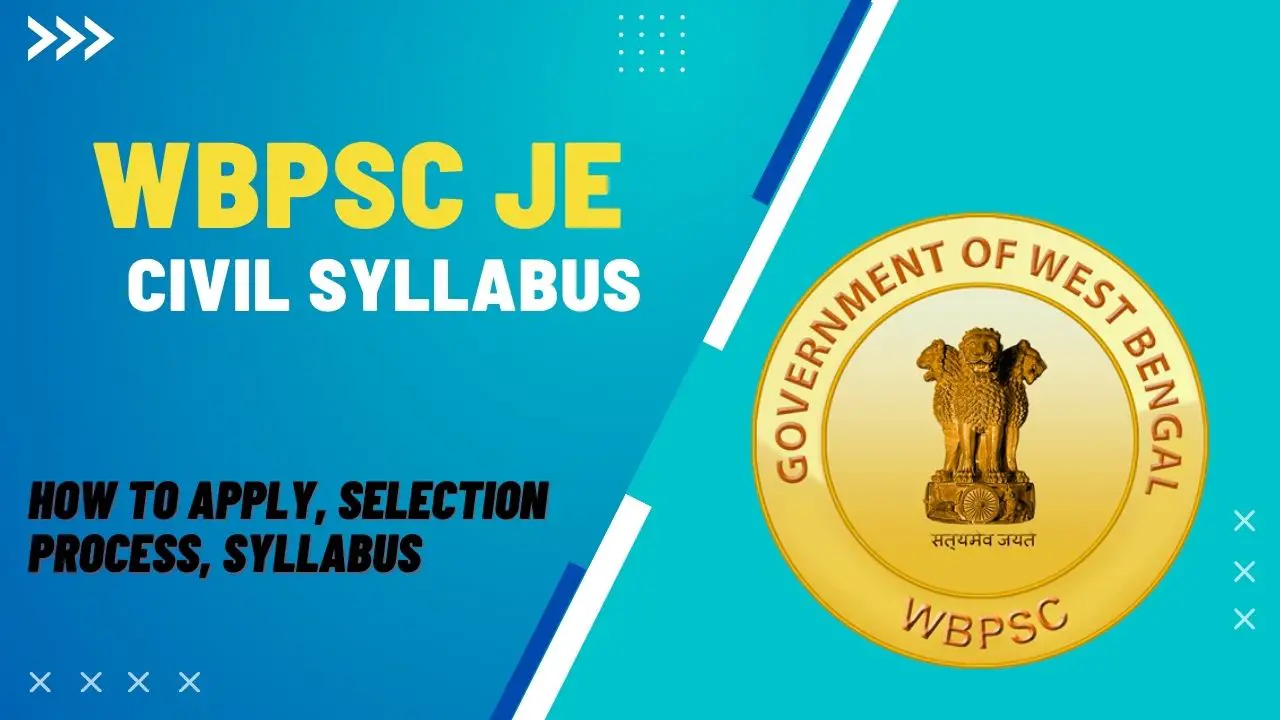The West Bengal Public Service Commission board of West Bengal has officially published all the information regarding the syllabus of WBPSC Junior Engineering in the field of Civil engineering. The selection process for the civil engineering exam will consist of a written examination and an interview. This article covers all the updates and details of the examination. All the candidates who aspire to give the examination should be updated with the syllabus and information regarding the examination.
Important Details
| Official Website | CLICK HERE |
| Name of the Organization | West Bengal Public Service Commission |
| Name of the Topic | Syllabus for WBPSC Junior Engineering [Civil] |
| Application Mode | Online |
| Location | West Bengal |
READ MORE: WBCHSE Class 11 Chemistry Syllabus: Exam Dates, Exam Pattern And More!
Eligibility Criteria
Nationality
The candidate should be a citizen of India. The domicile Certificate of West Bengal state for the WBPSC JE civil examination is not required but at the time of the selection process, the main priority will be given to the candidate who belongs to the West Bengal State and have the domicile certificate.
Age Limit And Age Relaxation
| Name of the category | Minimum Age Limit | Maximum Age Limit | Age Relaxation |
| Unreserved Category | 18 Years | 36 Years | N/A |
| OBC | 18 Years | 36 Years | 3 Years |
| SC/ST | 18 Years | 36 Years | 5 Years |
| People With Disability [PwD] | 18 Years | 45 Years | The age should not be more than 45 Years |
Selection Process
The WBPSC JE Civil Engineering selection process will be of 300 marks and consists of a written examination and an interview. The written examination will have a weightage of 200 marks and the interview process will have a weightage of 100 marks.
Written Examination
The written examination for civil engineering will consist of 100 questions and will be of 200 marks. The time given to the students for the examination will be of 2 hours or 120 minutes.
Interview
In the interview process, the students will be tested based on their communication skills, basic skills in the civil engineering field, and mental ability. The interview stage carries 100 marks.
WBPSC JE Civil Syllabus
| Name of the Topic | Syllabus Topics |
| Theory of structures | Design of basic structures, Timber Structures, Steel Structures, Design and Failure of Riveted Joints, Eccentric Riveted Connections, Design of Rolled Steel beams in flexure and shear, basic truss design |
| Construction Materials and Practice | Construction and the foundation, shallow and deep foundation, object, their different names and types, roofs and their types, and roof coverings which are used at specific locations. Underpinning and shoring, Scaffolding, general principles and precautions, advantages. Building materials and bricks, traditional bricks and their weight and size, LS classifications, Testing of concrete bricks and mortar, water cement ratio, slumps of concrete, uses of plywood stone, lime and sand, mosaic and roof tiles, expanded metal, frosted glass, etc. |
| Civil engineering drawing | Development of surface and isometric view |
| Strength of Materials | The plane figure of the center of Gravity, structural sections, Composite Rectilinear figures, Bending and shear stresses of beams and slope, Deflection of the cantilever, and simply supported beams such as UDL and Point load, eccentric loading on masonry pillars, bending and direct stress. Characteristics of the stress-strain curve for Mild Steel, B.M. and S.f. diagrams of loaded beams |
| Roads and Highways | Introduction of roads and highways, classification and difference of rural and urban roads as per IRC, Earth work with cutting and filling angle of repose, profile, benching, lift and lead, spoil bank, borrow pit, allowance for settlement, city roads and the kerb and channel, guide island, pedestrian crossing, road geometrics with vertical and horizontal curves, road alignment, equipment and instruments of road construction, camber, and its objectives, superelevation, and objects. |
| Foundation Engineering and Soil Mechanics | Particle size, classification properties and index of soil IS and MIT Sieve Analysis, earth pressure, coeff of passive earth, Angle of repose, resultant thrust, intensity diagram, Rakine’s Earth pressure theory |
| Irrigation | Canal, the Water requirement of the crops, hydrology, benefits of irrigation, river training works |
FAQs
Q1. Is the WBPSC JE exam tough?
No, it is not tough but it depends on how the candidate prepares for the exam. The candidate will be able to achieve the goal if dedicated preparation is done in the right way.
Q2. How should a candidate prepare for the exam?
The candidates should be completely aware of the exam pattern and syllabus. Select topics where improvement is needed and schedule the preparation for it accordingly. To achieve a good result in the exam, the candidates must maintain speed as well as accuracy.
Q3. What can be the benefits of the Exam Pattern?
Knowing about the exam pattern will help the individual understand the difficulty level of the exam and types of questions and important topics that need special attention. This will also help to give the individual knowledge about the marking scheme and the time given to every topic.
Q4. What is the total number of questions asked in the examination?
There will be a total of 100 questions asked in the examination.
Q5. What questions will be asked and how many marks will be allocated to each of them?
All the questions will be multiple choice questions and they all will hold 2 marks each with them.
Q6. What will be the selection process?
An interview will be taken followed by the written examination. (If only the candidate successfully passes the exam).
READ MORE: WBCHSE Bengali Class 12 Syllabus: Exam Dates, Exam Pattern And More!

